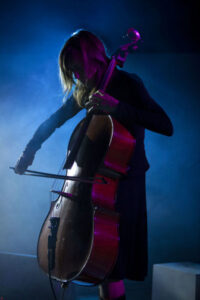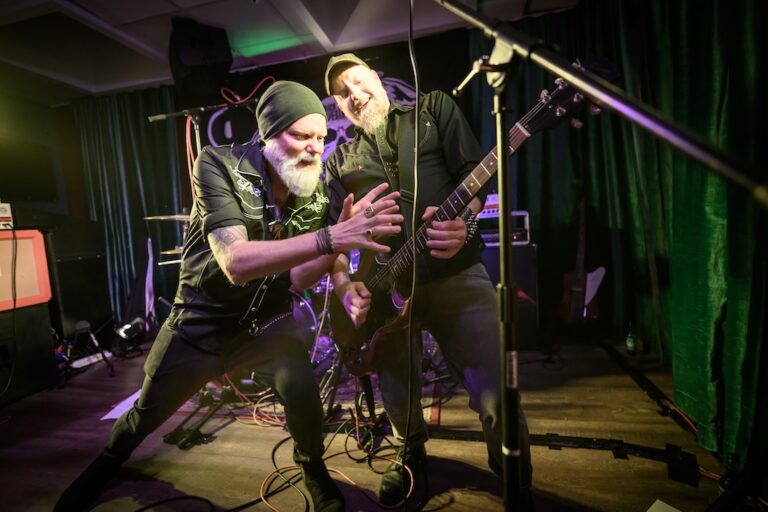Helen is really Alison Chesley, a cello player who decided to take her instrument on a journey through places cellos don’t usually go. Since she’ll be coming to Poland for Asymmetry Festival I had a chance to ask her a few questions.
K: Helen Money. That name has to be an instant success magnet. Apart from that, why did you decide to use a pseudonym?
I guess I felt like if it wasn’t my name than it could be anything I could imagine. And it could also include more people than just myself at some point. I think there is something heroic to the name, too, which I like.
K: You were a part of a band, you’re working as a session musician from time to time, composing music for a dance school and movies and have a solo career. Which of those brings you the most joy?
My solo work – Helen Money. I feel like that’s where I’m best able to express true myself. After that I really dig doing studio work – especially at great studios (I’m so lucky to live near two of the best – SOMA and Electrical Audio) and with interesting musicians. I love writing parts put also hearing what other people come up with. It is inspiring. It was especially fun to work with MONO, Broken Social Scene, and Russian Circles. Plague Bringer too. I feel like I learn something from all of them.
K: When I come across musicians who use instruments that are not usually used by metal or rock connected performing that kind of music whit them there’s one question that instantly pops into my head. Is it possible to be a self-thought cello player? I mean, there are people who learn by themselves to play a guitar or drums, but can you imagine that kind of stuff with classical instruments?
That’s a great question, Kosa. I would say, because of the bow, primarily, it would be very difficult to learn to play violin, viola or cello without some training. And I think that’s okay. I’m very thankful for all the practicing I did as a classical musician. The sound I learned to get, especially, I could never have gotten without the right technique. I am in no way a virtuoso and I’m fine with that – but sound to me is everything.
K: You mainly work with musicians playing music that I like to call alternative without dividing it into metal, sludge or post something. On your blog you wrote that you don’t consider yourself to be a classical musician anymore. When did you realize that playing classical music isn’t the path that you want to walk? Was it still when you were at Northwestern University?
Yes. I spent a lot of time in my 20s going to rock shows in Los Angeles before I decided to go to graduate school here in Chicago. My brother had turned me onto rock music when I was 22 – played the Who for me. After that is was all over. I went to see The Minutemen, Meat Puppets, Husker Du – tons of rock. When I decided to go back to grad school I had all that in my blood – even though I went back to study classical music and maybe teach. It felt like my only option as a cellist. Then at Northwestern (in Chicago) I met Jason Narducy and we started to play his music together. And it was rock/punk – great. Very influenced by Bob Mould who we were both way into. After that I knew it’s the music I wanted to play and rock musicians were the people I wanted to hang out with. So that was it. We opened for Bob Mould at the Metro here – he offered to produce our first record and I’ve never really looked back.
K: What inspires you as a musician, and who are your musical idols or masters?
I’m very inspired by music that is visceral. Emotional – serious. I really liked all the early SST bands, also The Who, Bob Mould. Also big, epic rock and classical music, like Mahler, Shostakovich. And I am inspired by Hendrix for his sound and dedication to his music.
K: You are also complaining on your blog that you’d like to share the emotions that your tour gives you. Why then are you performing alone? I think that there’s plenty of music in your acts for at least one or two more musicians.
I enjoy performing alone but definitely at some point I will bring others in. Not sure what that will look like at the moment but I’m looking forward to it.
K: I read that you think “Mono” is one of the worst, if not the worst of your songs. I find it to be one of the best, especially when I have a chance to listen to it and view it’s video. Are there any chances that you’ll be working with Nelson Chan in the future on another video? After all at the end there is the magical “To be continued”
He did a video for a song on my new record “Political Song for Michael Jackson to Sing”. It’s a cover of a Minutement tune that I really like. It’s up on YouTube at the moment.
K: Do you maybe sometimes fell like the cello’s Tom Morello, making it play like no one would expect it to?
I wish I was the cello’s Tom Morello. Seriously, I’m not really interested in “Cello Music” per se, but more the capabilities my cello gives me with my effects to express something. I’m more interested in being a good writer and musician than being a good cellist.
K: When I think about alternative music and cellos the image that instantly comes to me is Apocalyptica. Well at least till I came across your works. Would you place your work somewhere near the Fins? Do you know or like their works?
I don’t know the Fins. But if you mean Finnish music, I’m a big fan of Finnish folk music – a group like Frifot. It’s so dark and beautiful. I love that.
K: Apart from the fact that you don’t see yourself as a classical musician, do you sometimes play classics, I don’t know for fun?
Yes – I love Bach, and as a cellist I have the 6 suites I can work on. They are like the Mt. Olympus of cello music, but I can play just a few measures and feel like I have learned something about harmony/ melody and beauty.
K: Why didn’t Verbow work out?
Lots of reasons, but we had a very good run while it lasted. Jason and I are still very good friends.
K: Don’t you sometimes regret turning down a scholarship and choosing your solo career?
Sometimes I wonder what would have happened if I had followed that path, but I’m very happy I stayed in Chicago. It ended up being a very good place to write my music and be a musicican.
K: The record label that you choose, was a conscious decision, or a necessity as no one else wanted to publish it?
They weren’t the first label I contacted, but they ended up being a really great fit and I’ve met some really great musicians through that connection – people who are on the label, Roger Miller, Jonathan Kane, Peg Simone. The woman who did my liner notes, Terry de Castro (The Wedding Present) is an incredibly talented musician I would probably not have met otherwise.
K: How do people react to your shows? How many are there at your concerts? Do you think that if there were lyrics in your songs they would know them and sing them along with you, or are there mainly hearing your music for the first time as you perform it?
I usually get a good reaction. Just the fact that it’s a cello makes people notice. But I do think the tunes draw people in. They are very introspective in a way, I think. I seem to be very fortunate in the fact that I often play for an audience that is into extreme music and they are a great audience. They listen.
K: What’s the way that your music is going to evolve? Is it going to be more classical like your debut album, or more experimental as “In Tune”?
I’m not sure. I’ve just started writing the next record. I think it will be in a similar vein and will also be largely just me. It’s hard to tell what the process will generate when you’re in the middle of it.
K: Anything you’d like to say to our readers?
Thanks for being interested in my music. I’m really honored to have a chance to play for you.
Thanks for your precious time and see you in Poland!
K:Thank you!




